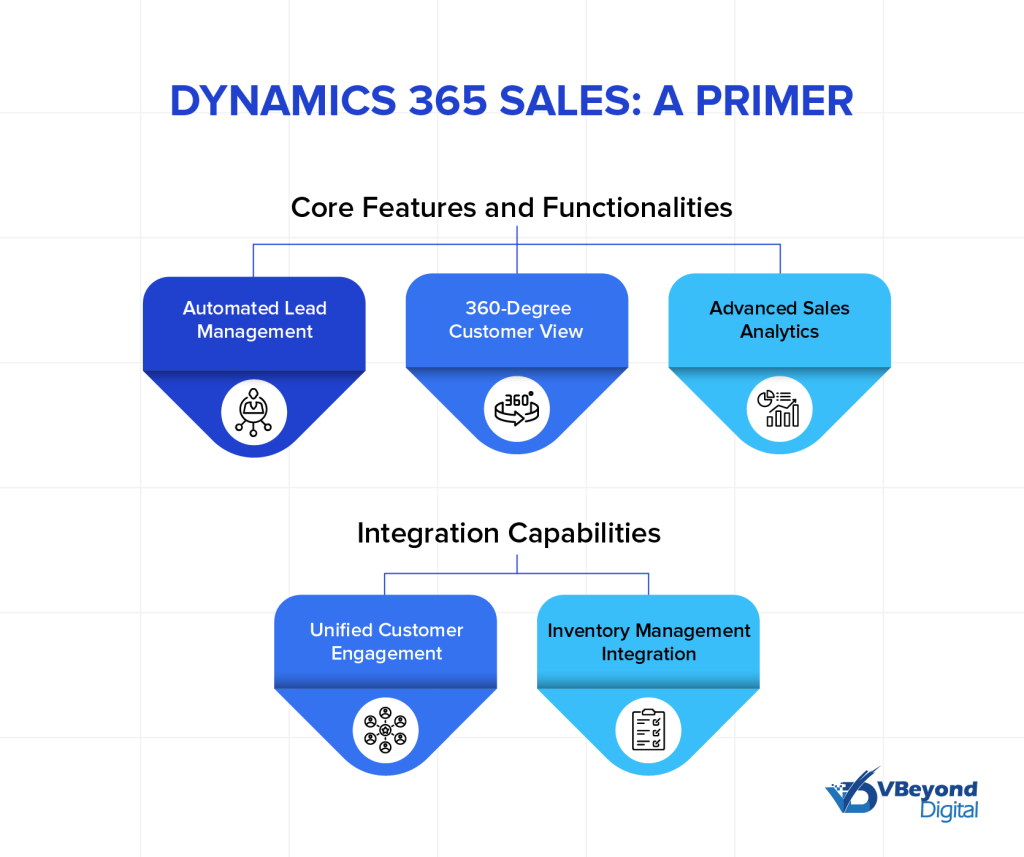Section
Boosting B2B E-commerce Efficiency with Dynamics 365 for Sales
Section
Section
This blog examines the pivotal role of Dynamics 365 for Sales in augmenting B2B e-commerce operations. It highlights how integrating Dynamics 365 customer engagement tools can refine sales strategies and improve interactions with business customers. Key topics include practical steps for deploying Dynamics 365 features to streamline sales processes and case studies demonstrating successful implementation in various industries. The content aims to provide actionable insights for businesses seeking to amplify their e-commerce efficiency and customer satisfaction.
B2B (business-to-business) e-commerce enterprises scaling their operations need to ensure back-end systems adapt to increased customer activity and ensure effective engagement to drive purchases. Microsoft Dynamics 365 Sales addresses these needs by integrating comprehensive tools for automating order, payments, and retargeting processes, managing customer data, and providing actionable insights. This blog explores how Dynamics 365 for Sales enhances B2B e-commerce operations, driving efficiency and improving customer interactions.
Dynamics 365 Sales: A Primer
Core Features and Functionalities
Dynamics 365 Sales is a vital part of the Dynamics 365 suite, offering extensive capabilities to manage the sales lifecycle. Key features include:
- Automated Lead Management: Automates lead capture and nurturing, ensuring no opportunities are missed, which enhances sales productivity and efficiency.
- 360-Degree Customer View: Integrates customer data from various touchpoints, providing a comprehensive view to tailor interactions effectively and improve customer satisfaction.
- Advanced Sales Analytics: Utilizes AI-driven insights to forecast trends, optimize sales strategies, and support data-driven decision-making.
Integration Capabilities
Dynamics 365 for Sales seamlessly integrates with other Dynamics 365 applications and popular e-commerce platforms, facilitating a unified approach to customer engagement and sales management. This integration enables:
- Unified Customer Engagement: Synchronizes marketing, sales, and service efforts across platforms, providing a consistent customer experience and improving engagement.
- Inventory Management Integration: Links with Dynamics 365 Supply Chain Management for real-time inventory tracking and efficient order fulfillment, reducing the risk of stockouts and overstock situations.

Key Benefits for B2B E-commerce
Sales Automation
Sales automation is a critical feature of Dynamics 365 for Sales, designed to enhance efficiency and accuracy in B2B e-commerce operations. By automating repetitive tasks, businesses can focus on more strategic activities. Key benefits include:
- Automated Lead Management: Automates the capture, tracking, and nurturing of leads, reducing manual errors and ensuring a steady flow of potential customers into the sales pipeline.
- Efficient Sales Processes: Automates follow-ups, reminders, and other routine tasks, allowing sales teams to focus on closing deals.
Customer Data Management
Dynamics 365 for Sales provides a unified customer view, which is essential for personalized marketing and sales strategies. This feature allows businesses to:
- 360-Degree Customer View: Consolidates customer data from various sources into a single view, enabling personalized interactions and targeted marketing campaigns.
- Enhanced Customer Insights: Utilizes AI and analytics to gain deeper insights into customer behavior, preferences, and purchasing patterns.
Integration Capabilities
The integration of Dynamics 365 Sales with other Dynamics 365 solutions such as Dynamics 365 Commerce and Dynamics 365 Supply Chain Management, and third-party platforms is crucial for seamless e-commerce operations. The benefits of this include:
- Real-Time Inventory Management Integration: Synchronizes with Dynamics 365 Supply Chain Management for accurate, real-time inventory tracking and order fulfillment.
- Unified Platform: Ensures that all departments, from sales to customer service, work from a single source of truth, improving collaboration and operational efficiency.
Enhancing B2B E-commerce Operations
Streamlined Sales Processes
Dynamics 365 for Sales offers a structured sales process that begins with lead generation and continues through to closing deals and beyond. The process includes several stages, each critical to managing and closing sales effectively.
- Lead Generation and Qualification: Leads can be generated from various sources, including website opt-ins, email queries, and business cards collected at events. Dynamics 365 automates the lead capture process and helps qualify leads, converting them into opportunities.
- Opportunity Management: Once leads are qualified, they become opportunities. This stage involves developing details about the potential deal, such as the products or services of interest, estimated revenue, and timelines. The system allows for creating multiple quotes and proposals, which are then reviewed internally and externally.
- Proposal and Quotation: Proposals are created and presented to potential customers. Dynamics 365 enables the creation and management of quotes, ensuring that all necessary details and approvals are documented.
- Order and Fulfillment: Upon customer agreement, an order is generated, and the deal is closed. Dynamics 365 tracks the fulfillment process, from order creation to invoicing, ensuring a smooth transition from sales to delivery.
Inventory and Order Management Integration
The integration between Dynamics 365 Sales, Dynamics 365 Commerce and Dynamics 365 Supply Chain Management is pivotal for efficient inventory and order management. This integration facilitates:
- Real-Time Inventory Management: Provides accurate, real-time visibility into inventory levels, ensuring stock availability and timely order fulfillment. This capability helps avoid stockouts and overstock situations, which are critical in e-commerce.
- Order Processing: Streamlines the order processing workflow, from order receipt to delivery. Integration ensures that inventory data is up to date, allowing for efficient order management and customer satisfaction.
- End-to-End Visibility: Offers a cohesive view of the entire order lifecycle, from sales to delivery, enabling better decision-making and operational efficiency.
Case Study: Tan Boon Ming Sdn Bhd (TBM), a leading appliance retailer in Malaysia, integrated Dynamics 365 Supply Chain Management to overcome challenges related to data synchronization and manual processes. The integration allowed TBM to achieve greater visibility into its warehouse and inventory, significantly reducing the effort required to manage these critical operations (Microsoft).
Case Study: Chemist Warehouse, a major Australian retailer, moved its operations to Dynamics 365 to support its international expansion. The integration with Dynamics 365 Supply Chain Management provided better visibility into product availability and improved the efficiency of its order fulfillment processes (Microsoft).
Section
Section
Explore Dynamics 365 Sales Today!
Real-Time Analytics and Decision Making
Utilization of AI and Analytics
Real-time analytics is a cornerstone of Dynamics 365 for Sales, offering businesses the ability to make informed decisions quickly. The AI-driven capabilities provide valuable insights into sales performance and market trends. Key features include:
- Predictive Analytics: Uses AI to forecast sales trends, helping businesses to anticipate market changes and adjust strategies accordingly.
- Performance Metrics: Tracks key performance indicators (KPIs) in real time, providing actionable insights to drive sales strategies.
Case Studies
- Lenovo: By leveraging Dynamics 365 Sales, Lenovo has achieved higher profits, and marked cost savings. The streamlined and shortened sales cycles have improved customer service and responsiveness, boosting productivity and profitability. The implementation has led to a potential USD 1.3 billion increase in annual global sales and saved USD 4 million per year in licensing costs. Additionally, Lenovo has increased their gross profit margin, reduced IT support needs, and standardized business processes across regions, enhancing client engagement and empowering employees with a user-friendly system.
- Michael Hill: The international jewelry retailer utilized Dynamics 365 to enhance its operational efficiency during the global pandemic. By implementing real-time inventory management and sales analytics, Michael Hill significantly improved its ability to respond to customer needs and market conditions (Microsoft).
Impact on B2B E-commerce Strategies
The integration of AI and real-time analytics within Dynamics 365 for Sales enables e-commerce businesses to:
- Monitor Sales Performance: Continuously track and analyze sales data to identify high-performing products and sales tactics.
- Adjust Marketing Strategies: Quickly adapt marketing efforts based on real-time insights into customer behavior and preferences.
- Improve Customer Engagement: Use predictive analytics to anticipate customer needs and personalize interactions, driving higher satisfaction and loyalty.
Example: Franklin Templeton, a leading asset management firm, implemented Dynamics 365 Sales to consolidate its customer data and leverage advanced analytics. This integration has improved their operational efficiency and provided deeper insights into client relationships, allowing for more informed decision-making and enhanced customer engagement.
Personalizing Customer Experiences
Tailored Customer Interactions
Dynamics 365 for Sales enables businesses to provide personalized customer experiences through advanced customer relationship management (CRM) capabilities. Key benefits include:
- 360-Degree Customer View: This feature consolidates customer data from multiple sources, allowing businesses to gain comprehensive insights into customer preferences and behaviors.
- Targeted Marketing Campaigns: By leveraging detailed customer insights, businesses can create and execute highly targeted marketing campaigns that resonate with individual customers.
Impact on Customer Satisfaction and Loyalty
Personalized interactions are crucial for increasing customer satisfaction and loyalty. Dynamics 365 Sales supports this by:
- Predictive Customer Insights: Utilizing AI to predict customer needs and behaviors, allowing businesses to tailor their offerings and communications effectively.
- Consistent Customer Engagement: Ensuring that all customer touchpoints, whether online or offline, provide a consistent and personalized experience.
Case Study: Andreas Stihl AG & Co. KG, a global leader in power tools, implemented Dynamics 365 Sales to unify its CRM systems. This integration provided a 360-degree view of customers and dealers, significantly speeding up customer support response times and improving transparency across its sales subsidiaries (Microsoft).
Case Study: Siemens Mobility, a premier supplier of transportation solutions, adopted Dynamics 365 to personalize and streamline marketing communications. This implementation has enhanced their ability to manage complex customer journeys and improve sales processes from lead acquisition to deal closure (Microsoft).
Improving Customer Conversion Rates
Tools and Strategies for Customer Conversion
Dynamics 365 Sales offers a range of tools and strategies to enhance the customer journey and boost conversion rates. Key features include:
- Automated Lead Management: Streamlines the lead nurturing process, ensuring timely follow-ups, and reducing the risk of losing potential customers.
- Sales Insights: Provides data-driven insights into customer behaviors and preferences, enabling sales teams to tailor their approaches and improve conversion rates.
Effective Upselling and Cross-Selling
Leveraging Dynamics 365 insights, businesses can implement effective upselling and cross-selling strategies. These techniques help in maximizing the value of each customer interaction. Key strategies include:
- Personalized Recommendations: Use AI-driven insights to recommend relevant products or services based on customer purchase history and preferences.
- Targeted Marketing Campaigns: Create personalized marketing campaigns that highlight complementary products, driving higher sales and customer satisfaction.
Case Study: Ernst & Young (EY), one of the largest accounting firms globally, utilized Dynamics 365 Sales to overhaul its sales processes. This implementation helped EY improve client engagement and conversion rates by providing sales teams with actionable insights and automated lead management (Microsoft).
Case Study: Lexmark, a leading provider of printing and imaging products, integrated Dynamics 365 Sales to streamline its sales processes. The implementation resulted in a significant reduction in quote revisions and an increase in conversion rates by providing sales teams with real-time insights and automated workflows (Microsoft).
Security and Compliance
Security Features in Dynamics 365
Security is a paramount concern for e-commerce businesses handling sensitive customer and business data. Dynamics 365 for Sales offers advanced security features to protect this data, ensuring compliance with global regulations. Key security features include:
- Data Encryption: Ensures that all data transmitted and stored within Dynamics 365 is encrypted, protecting it from unauthorized access.
- Multi-Factor Authentication (MFA): Adds an additional layer of security by requiring multiple forms of verification before granting access.
Compliance with Global Regulations
Dynamics 365 for Sales helps businesses comply with various data protection regulations, such as GDPR, by providing tools and features that support these requirements. Key compliance features include:
- Data Residency and Sovereignty: Ensures that data is stored in specific geographic locations as required by local laws.
- Audit Logs: Maintains comprehensive logs of all data access and changes, facilitating compliance audits and investigations.
Implementation Considerations
Steps for Successful Implementation
Implementing Dynamics 365 for Sales in an e-commerce environment requires careful planning and execution. Here are the key steps to ensure a successful deployment:
Assessment and Planning
- Needs Analysis: Conduct a thorough analysis of business needs and objectives to align Dynamics 365 functionalities with organizational goals.
- Stakeholder Engagement: Involve key stakeholders from various departments to gather requirements and ensure buy-in.
System Configuration
- Customization: Tailor Dynamics 365 for Sales to meet specific business processes and workflows.
- Integration: Ensure seamless integration with existing systems, such as e-commerce platforms and inventory management solutions.
Data Migration
- Data Mapping: Identify and map existing data sources to Dynamics 365, ensuring accuracy and consistency.
- Data Cleansing: Clean and validate data before migration to avoid issues during the implementation.
Training and Change Management
- User Training: Provide comprehensive training for all users to maximize the adoption and effective use of the system.
- Change Management: Implement a change management strategy to address resistance and facilitate smooth transitions.
Testing and Validation
- System Testing: Conduct extensive testing to identify and resolve any issues before the go-live date.
- User Acceptance Testing (UAT): Involve end-users in testing to ensure the system meets their needs and expectations.
Go-Live and Post-Implementation Support
- Go-Live Plan: Develop a detailed go-live plan, including a timeline and contingency plans.
- Ongoing Support: Provide continuous support and maintenance to address any issues and optimize the system’s performance.
Common Challenges and Best Practices
Implementing Dynamics 365 for Sales can present several challenges. Here are some common issues and best practices to overcome them:
- Data Quality Issues: Ensuring high-quality data is crucial. Regular data audits and cleansing practices can mitigate this risk.
- User Resistance: Address user resistance through effective change management strategies and by highlighting the benefits of the new system.
- Integration Complexities: Plan for integration complexities by involving technical experts early in the process and conducting thorough testing.
- Customization Overload: Avoid excessive customization by focusing on core functionalities and best practices provided by Dynamics 365.
Conclusion
As B2B e-commerce enterprises continue to grow on a global scale and scope of operations, the need for efficient and effective sales management systems becomes increasingly critical. Dynamics 365 Sales provides the tools and capabilities necessary to enhance operational efficiency, improve customer engagement, and drive business growth.
If your current systems are not meeting your expectations or if you seek to gain a competitive edge in the B2B e-commerce market, consider evaluating Dynamics 365 for Sales. By implementing this powerful solution, you can streamline your operations, gain valuable insights, and deliver exceptional customer experiences.




